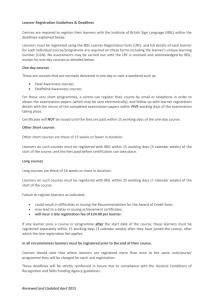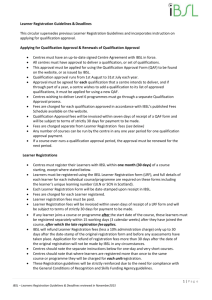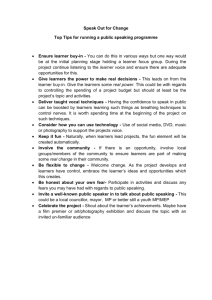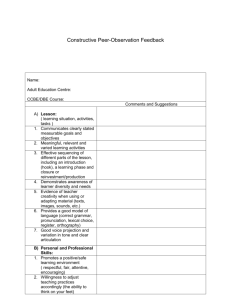Reasonable Adjustments
advertisement
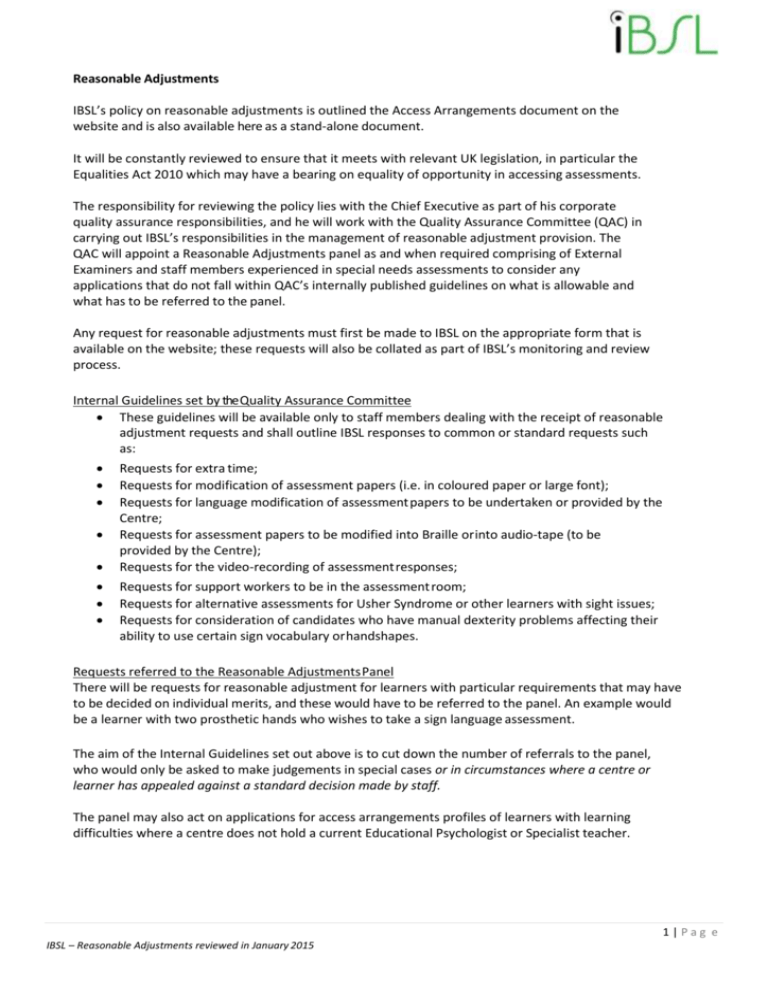
Reasonable Adjustments IBSL’s policy on reasonable adjustments is outlined the Access Arrangements document on the website and is also available here as a stand-alone document. It will be constantly reviewed to ensure that it meets with relevant UK legislation, in particular the Equalities Act 2010 which may have a bearing on equality of opportunity in accessing assessments. The responsibility for reviewing the policy lies with the Chief Executive as part of his corporate quality assurance responsibilities, and he will work with the Quality Assurance Committee (QAC) in carrying out IBSL’s responsibilities in the management of reasonable adjustment provision. The QAC will appoint a Reasonable Adjustments panel as and when required comprising of External Examiners and staff members experienced in special needs assessments to consider any applications that do not fall within QAC’s internally published guidelines on what is allowable and what has to be referred to the panel. Any request for reasonable adjustments must first be made to IBSL on the appropriate form that is available on the website; these requests will also be collated as part of IBSL’s monitoring and review process. Internal Guidelines set by the Quality Assurance Committee These guidelines will be available only to staff members dealing with the receipt of reasonable adjustment requests and shall outline IBSL responses to common or standard requests such as: Requests for extra time; Requests for modification of assessment papers (i.e. in coloured paper or large font); Requests for language modification of assessment papers to be undertaken or provided by the Centre; Requests for assessment papers to be modified into Braille or into audio-tape (to be provided by the Centre); Requests for the video-recording of assessment responses; Requests for support workers to be in the assessment room; Requests for alternative assessments for Usher Syndrome or other learners with sight issues; Requests for consideration of candidates who have manual dexterity problems affecting their ability to use certain sign vocabulary or handshapes. Requests referred to the Reasonable Adjustments Panel There will be requests for reasonable adjustment for learners with particular requirements that may have to be decided on individual merits, and these would have to be referred to the panel. An example would be a learner with two prosthetic hands who wishes to take a sign language assessment. The aim of the Internal Guidelines set out above is to cut down the number of referrals to the panel, who would only be asked to make judgements in special cases or in circumstances where a centre or learner has appealed against a standard decision made by staff. The panel may also act on applications for access arrangements profiles of learners with learning difficulties where a centre does not hold a current Educational Psychologist or Specialist teacher. 1|Pag e IBSL – Reasonable Adjustments reviewed in January 2015 Relevance, reliability & comparability of Assessment In granting reasonable adjustment to any learner, the Reasonable Adjustment panel will take note of Ofqual, Scottish Accreditation & Accreditation Wales’s guidelines relating to learners who are eligible for adjustments, as well as IBSL’s own Internal Guidelines set out above. At all times, any assessment must be a fair test of a learner’s knowledge and what they are able to do to demonstrate their competency and skills within the qualification and any grant of reasonable adjustment must ensure that the arrangements do not invalidate the specified assessment requirements as set out in the specifications for the relevant qualification and that they reflect the current needs and practices of the learner in question. The arrangements must also ensure that they do not give unfair advantage to learners, whether real or perceived, in order to safeguard the integrity of the qualification. Access arrangements permitted by a centre There will be occasions where there has been an established practice by a Centre to allow access arrangements to their own learners. In these cases, the Centre should issue a notification to IBSL and list those learners to whom they have granted arrangements. These include extra time (up to a maximum of 25%), rest breaks, provision of transcripts, prompters, use of bilingual dictionaries either with or without extra time, use of amanuenses, use of videorecording of evidence and use of sign language interpreting support. IBSL will review these notifications and advise the Centre as appropriate. It may well be that some of these practices are not appropriate to IBSL qualifications and the Centre will be informed accordingly. Monitoring and evaluation All requests for reasonable adjustments, access to alternative assessments, or requests for special consideration (see below) will be subjected to a monitoring and evaluation process carried out by the Administration Team reporting to the Chief Executive who will consider and evaluate the data annually and recommend publication in an annual report that is made available, if requested, to the public and to the regulatory authorities. Office use only: IBSL – Reasonable Adjustments created and revised on: Created in January 2012 Reviewed in January 2015 2|Pag e IBSL – Reasonable Adjustments reviewed in January 2015
